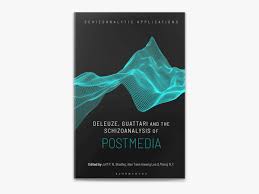Table of Contents
Schizoanalysis in the Age of Algorithmic Media
Deleuze, Guattari and the Schizoanalysis of Postmedia is a potent re-examination of Deleuzo-Guattarian thought amid the fragmented and hyper-mediated conditions of contemporary life. This 2023 volume, part of Bloomsbury’s Schizoanalytic Applications series, forges new conceptual weapons to diagnose, disrupt, and deterritorialize the postmedia subject.
Authors Joff P. N. Bradley, Alex Taek-Gwang Lee, and N. Y. Manoj embrace the fluid, rhizomatic logic of Deleuze and Guattari to critique our interface-saturated world—not from a place of nostalgia, but from a radical will to reconfigure desire, perception, and collectivity.
Core Themes: Rhizomes, Assemblages, and Algorithmic Subjectivity
Postmedia and the Collapse of Medium Boundaries
“Postmedia” is treated not as a genre or chronology, but as a paradigm of collapse—where distinctions between sender and receiver, platform and content, self and data, implode. The postmedia condition folds desire into interface. Media no longer represents; it produces. It does not reflect subjectivity—it conditions it.
This is where schizoanalysis becomes crucial: not to analyze messages, but to map flows, blockages, and ruptures in affect, code, and control.
Schizoanalysis vs. Psychoanalysis
Unlike Freud’s inward focus, schizoanalysis is exteriorizing. It seeks the machinic unconscious, the assemblages of power, tech, and ideology shaping the subject from outside. The authors follow Deleuze and Guattari in opposing the Oedipalization of thought. The unconscious is not a drama—it’s a diagram of flows and breaks, of desiring-machines and coded territories.
In the postmedia context, this means rejecting pathologization in favor of mapping libidinal economies of control.
Rhizomatic Thought and Algorithmic Capture
The rhizome is not metaphor—it’s a method. Rhizomatic thought resists hierarchical structures, offering instead horizontal connectivity, multiplicity, and unpredictability. But in the postmedia era, this very principle is weaponized by platforms: algorithmic governance mimics rhizomes, only to recapture them through predictive analytics.
The challenge, then, is to find modes of escape—not regression—through lines of flight, rupturing the apparatuses of visibility and control.
Assemblages of Resistance
The book proposes new assemblages of theory and praxis—feminist, postcolonial, ecological. From K-pop resistance to Indian philosophical multiplicities, the contributors challenge Eurocentric overcoding and propose pluralist strategies rooted in global flows of counter-subjectivity.
Rather than critique from above, they plug into the system, amplifying glitch, noise, and anomaly as tools for conceptual sabotage.
Influence and Legacy: Deleuze and Guattari Rewired
This volume is part of a growing body of neo-schizoanalytic work, where thinkers are reworking Deleuze and Guattari to make sense of:
- Postdigital subjectivity
- Platform capitalism and control societies
- AI, deep learning, and media automation
- Neoliberal affect economies
It resonates alongside texts like:
- Capitalist Realism (Mark Fisher)
- Psychopolitics (Byung-Chul Han)
- Post-Cinematic Affect (Steven Shaviro)
Yet this book distinguishes itself through rigorous application, drawing from specific cultural contexts—especially East and South Asia—and challenging Euro-American narrative hegemony.
Strengths and Limitations
Strengths:
- Applies complex Deleuzian ideas with contemporary precision
- Bridges theory and praxis through case studies and global perspectives
- Offers a rich interdisciplinary synthesis spanning philosophy, media theory, and cultural criticism
Limitations:
- Assumes significant prior knowledge of Deleuze and Guattari
- Dense terminology may alienate casual readers
- Lacks a sustained engagement with material infrastructures of media tech
Who Should Read It?
- Readers of Deleuze, Guattari, and poststructuralist theory
- Scholars of media philosophy, digital culture, and critical theory
- Activists and thinkers exploring radical aesthetics and resistance to platform logic
- Anyone ready to embrace schizoanalysis as a toolkit for dismantling contemporary subjectivity
TL;DR
This book is not merely a commentary on Deleuze and Guattari—it is an operational manual for philosophical insurgency in the age of postmedia. By foregrounding schizoanalysis as a living method, the authors chart new paths across interface capitalism, algorithmic culture, and cognitive capture.
Deleuze, Guattari and the Schizoanalysis of Postmedia is a dense, brilliant, and urgently necessary work for those seeking to reimagine subjectivity—not through introspection, but through disassembly.

Leave a Reply